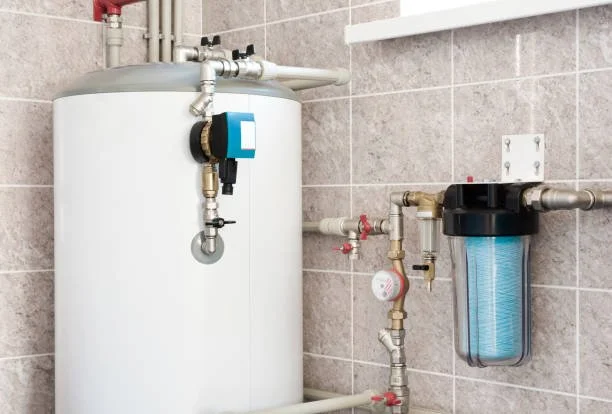How does a Gas Hot Water System work?
RH Business Marketing Solutions
What is a Hot Water System?
Hot water is an indispensable part of our daily lives, whether for a refreshing morning shower, washing dishes, or doing laundry. We often take it for granted, but have you ever wondered how that comforting stream of hot water magically appears at your faucet? Gas hot water systems are one of the most popular choices for heating water in homes, and in this blog, we'll unravel the mystery behind their efficient operation.
Gas hot water systems are renowned for their reliability and efficiency. In this comprehensive guide, we'll delve into the intricacies of these systems, from the components that make them tick to the step-by-step processes involved in heating water. By the end of this journey, you'll deeply understand how these systems work, their advantages, maintenance tips, and even safety features.
Components of a Gas Hot Water System
We must first acquaint ourselves with its fundamental components to understand how a gas hot water system operates. At the heart of this system, you'll find four key players: the water tank, burner, thermostat, and flue. These components work harmoniously to ensure a continuous hot water supply in your home.
● Water Tank: The water tank is the reservoir where cold water enters and is subsequently heated. It's the system's backbone, storing the hot water until you need it.
● Burner: The burner is where the magic happens. It's responsible for heating the water in the tank. Whether powered by natural gas or propane, the burner's job is to generate the necessary heat.
● Thermostat: The thermostat acts as the brain of the operation. It monitors the water temperature and instructs the system when to heat the water and when to stop. This precision ensures that you get hot water at the desired temperature consistently.
● Flue: The flue is the exhaust system responsible for safely removing combustion byproducts such as carbon monoxide and venting them outside. It's a crucial safety feature of the system.
Step-by-Step Process
1. Fuel Supply
Now that we know the key components, let's dive into the step-by-step process. It all starts with the fuel supply. Gas hot water systems usually rely on natural gas or propane. A gas line connects this fuel source to the system.
The gas valve plays a pivotal role in regulating gas flow to the burner. Safety features like pressure relief valves and gas leak detectors ensure the fuel supply remains controlled, minimising potential hazards.
2. Ignition
Once the fuel supply is ready, it's time to ignite the burner. It is where the pilot light or electronic ignition comes into play. The pilot light is a small, continuously burning flame that ignites the main burner when needed. In modern systems, electronic ignition has primarily replaced the pilot light, providing a more energy-efficient and reliable method of starting the burner.
3. Combustion
With the burner ignited, combustion begins. The burner's primary function is to generate intense heat by burning natural gas or propane. This heat is directed towards the bottom of the water tank, heating the water within.
Natural gas and propane are ideal fuel sources because they produce a clean and consistent flame, ensuring efficient combustion.
4. Heat Transfer
The burner blazes and transfers heat from its surface to the water in the tank.
This heat transfer occurs through a heat exchanger or coils strategically placed within the tank to maximise efficiency. The water gradually absorbs the heat, raising its temperature.
5. Temperature Control
Maintaining a consistent water temperature is crucial for comfort and safety. It is where the thermostat steps in. It constantly monitors the water temperature and communicates with the burner, directing it to fire up when it drops below the desired level. This precise control ensures you get the hot water you need when you need it.
6. Distribution
Now that we have hot water in the tank, it's time to distribute it throughout your home. A network of pipes and faucets achieves it. When you turn on a hot water tap, the pressure difference between the hot and cold water pipes forces the heated water out of the tank and into your fixtures, providing you with that comforting stream of hot water.
7. Safety Features
Safety is paramount in gas hot water systems. They come equipped with various safety features to protect you and your home. One such feature is the pressure relief valve, which releases excess pressure to prevent tank rupture. Additionally, modern systems are equipped with gas leak detectors and carbon monoxide sensors to ensure safety.
Advantages of Gas Hot Water Systems
What do you think are the benefits of gas hot water system? Now that we've unravelled the inner workings of a gas hot water system let's explore why they are such a popular choice. Gas systems offer several advantages, including energy efficiency, cost savings, and reliability. Their ability to provide a continuous hot water supply makes them a favourite among homeowners.
Maintenance Tips
Following a regular maintenance routine is essential to keep your gas hot water system operating at peak performance. We'll provide you with valuable tips on maintaining your system and even troubleshooting common issues that may arise.
Conclusion
In conclusion, gas hot water systems are marvels of engineering, providing us with the luxury of hot water at our fingertips. From the components that make them function to the safety features that keep us protected, these systems play a vital role in our daily lives. Proper maintenance ensures your system delivers hot water efficiently and safely. Reach out to Metropolitan Hot Water if you need assistance and help from professionals regarding using a gas hot water system in your home.
